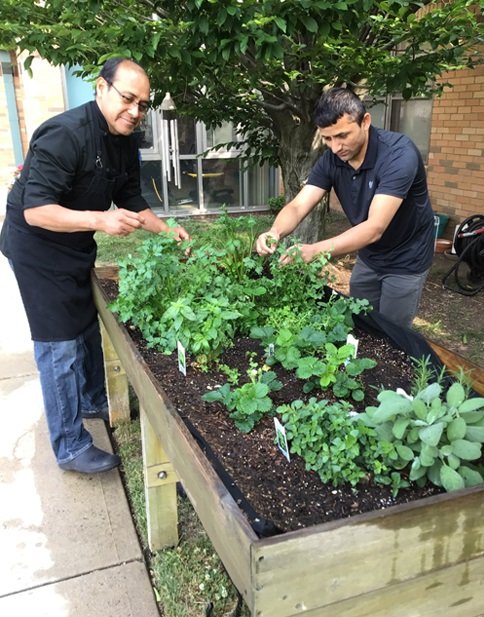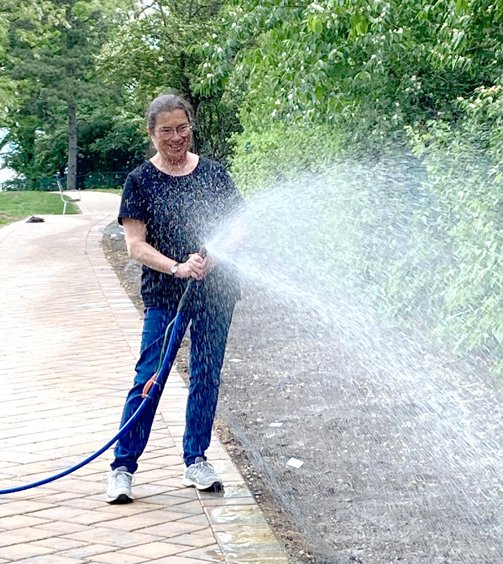FrankTalk: Can We Grow in Awe and Wonder?
Juan Gonzalez and Sabrudin Hakimi tend the garden at St. Michael Villa.
by Frank McCann, Congregation Peace through Justice Facilitator
Becoming a Congregation that lives Pope Francis’ encyclical Laudato Si’ involves more than just turning off lights or taking shorter showers to conserve water. We are committing to a new consciousness concerning our relationships with Earth, our neighbors and fellow creatures. Doing so provides hope and a means for ending the extinction event we have initiated. Developing an ecological spirituality requires a profound personal transformation.
The need for a new consciousness is evident when Pope Francis writes of Sister Earth:
We have come to see ourselves as her lords and masters,
entitled to plunder her at will. The violence present in our hearts,
wounded by sin, is also reflected in the symptoms of sickness
evident in the soil, in the water, in the air and all forms of life…
We have forgotten that we ourselves are dust of the earth (cf. Gen
2:7); our very bodies are made up of her elements, we breathe
her air and we receive life and refreshment from her waters.
— Laudato Si’, 2
Developing an ecological spirituality means opening ourselves again to the mysteries of life, to reverence each other and other life forms, regularly reflecting on the fact that we are all connected. Can we rediscover the numinous presence as we walk among the trees becoming more aware of the ongoing miracles that surround us? Can we grow in awe and wonder as we plant a flower garden? We should try. We need a corrective to the anthropocentric, technological voice that would use every resource on earth for more profit without a thought as to how that will bring life as we know it to an end.
Thomas Berry studied the religious traditions from around the world relating to creation. He also studied the science. From both faith and science, he came to understand “the universe is not a collection of objects but a communion of subjects.”
Mindy McDonald, CSJP waters the newly planted wildflower garden at St. Michael Villa.
Our bodies are 55-60% water. Why do we stand for water being polluted by fertilizers and feces, or by oil and chemical waste from mining? How is it that water is treated as a commodity to be used to pay national debts, or to be bottled in plastic and sold? Is convenience so important to us that we will continue to use plastic which is poisoning our oceans and even entering our bloodstreams? Can we recover the sense of water as sacred to our lives, as the sustainer of life?
Recently, air in the United States was contaminated by smoke from climate-change-induced forest fires in Canada, blown down into our neighborhoods. Both countries have been burning fossil fuels. For some, the smoke crossing borders was a wakeup call to our interconnectedness, an example of how meaningless borders can be in an increasingly interconnected global community. For others, it was just another opportunity to blame another country.
Are we not also connected to the polar bears in the northern regions, or to the people of Vanuatu in the South Pacific whose islands are being swallowed by rising seas, battered by cyclones, and threatened by earthquakes? These people have done nothing to cause climate disruption. What about our responsibilities to the millions of migrants, forced to flee their homes due to rising seas, drought, or flooding, who now sit at the borders of many nations around the globe looking for a new place to call home? What about the estimated 140 plant, animal and insect species that become extinct daily? What environment do we owe to our children and grandchildren?
To be who we say we are, we start with Jesus’ admonition to love our friends and our enemies (Mt. 5:44), to realize our neighbors are not just people who live near us (Lk. 10:25-37). We recognize we are part of creation, interconnected to all life. How can we proclaim to love God when we actively destroy the abundant and beautiful creation provided for us?
Look around and let the reality of what is happening to our common home sink in. Let our hearts be moved and our consciousness be changed. Let us read again the words of Pope Francis from his Laudato Si’ encyclical:
It must be said that some committed and
prayerful Christians, with the excuse of realism
and pragmatism, tend to ridicule expressions
of concern for the environment. Others are
passive; they choose not to change their
habits and thus become inconsistent. So what
they all need is an “ecological conversion”,
whereby the effects of their encounter
with Jesus Christ become evident in their
relationship with the world around them.
Living our vocation to be protectors of God’s
handiwork is essential to a life of virtue; it is
not an optional or secondary aspect of our
Christian experience.
— Laudato Si’, 217
This article appeared in the Autumn 2023 issue of Living Peace.


